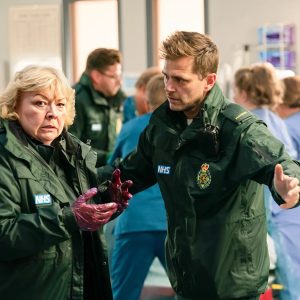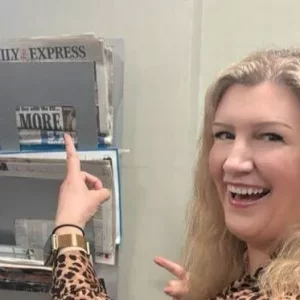In Casualty’s emotionally charged episode “Plan B,” Indie Jankowski finds herself at the center of a dangerous gamble that leaves her career hanging in the balance. While much of the episode focuses on Stevie Nash’s high-stakes surgery and the simmering tension between Rida and Russell, Indie’s storyline presents a powerful portrait of a medic making an impossible decision—and living with the weight of the consequences.
A Snap Decision in the Field
When Indie responds to a seemingly routine emergency call, the situation escalates fast. A young patient appears stable but has a vague medical history and subtle red flags. Indie senses something isn’t right, but after a quick assessment and under pressure to clear the scene, she makes a controversial call—downgrading the urgency of the case. That decision, made in seconds, soon spirals into disaster when the patient rapidly deteriorates after arriving at the ED.
By the time the patient is resuscitated and stabilized, the blame has already begun to circulate. The attending doctors question why the call wasn’t marked as a red priority. Indie is pulled aside, her notes reviewed, and she’s asked to justify her assessment in front of her peers.
The Weight of a Badge
Indie isn’t reckless—she’s experienced, intuitive, and deeply empathetic. But even the best medics know that instinct can sometimes clash with protocol. As she’s interrogated about her judgment call, Indie’s confidence begins to erode. Her internal voice, once calm and steady, now second-guesses everything. Could she have missed a sign? Did she let external pressure—from time constraints or staffing gaps—influence her decision?
It’s a crushing position to be in. Indie wears her uniform with pride, but for the first time, she begins to wonder if the system she serves will protect her when she falters—or punish her for being human.
Support from an Unexpected Source
Amid the chaos, Indie finds unlikely support in Iain Dean, who’s no stranger to the fallout of tough field calls. He’s been through disciplinary hearings, emotional burnout, and the grief of lost patients. Iain doesn’t sugarcoat the situation, but he reminds Indie that being a paramedic means living in the grey area. “You can follow every rule,” he says quietly, “and still lose someone. And you can break one, and save a life.”
It’s not a pass—it’s a perspective. And it gives Indie just enough strength to keep her head up as she’s called in for a review.
Facing the ED and Facing Herself
What makes Indie’s storyline so compelling is not just the external scrutiny—but the internal fallout. The ED isn’t openly hostile, but there’s a chill in the air. A few glances, a muttered comment near the staff lockers. Paramedics rarely get the full picture, but doctors often expect them to.
When Indie catches sight of the young patient’s family in the waiting room, her composure nearly crumbles. She keeps her distance, but the mother’s tearful eyes stay with her long after her shift ends.
Later, she pulls out her notebook and rewrites the case from memory—not for official documentation, but for herself. She combs through every moment, every choice. It’s an act of self-flagellation, yes—but also one of reflection and growth. Indie isn’t just worried about her job. She’s worried about what this means for her as a person.
A Systemic Problem
Indie’s situation also subtly highlights a larger issue in the NHS: burnout and overstretched crews. Callouts are relentless. Protocols shift constantly. Decisions must be made at warp speed with limited information. Casualty smartly weaves this in without hammering the point, allowing viewers to see how structural strain affects even the most capable medics.
When Indie’s team leader suggests that she “might benefit from a little more caution in future,” it’s both a reprimand and a dodge. The system failed that patient as much as Indie did—but only one of them is sitting in the hot seat.
Conclusion: A Hero with Scars
By the end of the episode, Indie isn’t fired. She isn’t praised either. She’s left in limbo—still working, still capable, but carrying a scar that no one else can see. She goes home exhausted, closes the door to her flat, and lets herself break for just a moment. Tears fall, not from guilt alone—but from the sheer emotional load of the job.
“Plan B” offers no tidy resolution for Indie Jankowski, and that’s what makes it so real. Sometimes, being a medic means walking through hell with no applause, no closure—just the hope that next time, you’ll get it right. And knowing that even if you don’t, you’ll show up again anyway.





